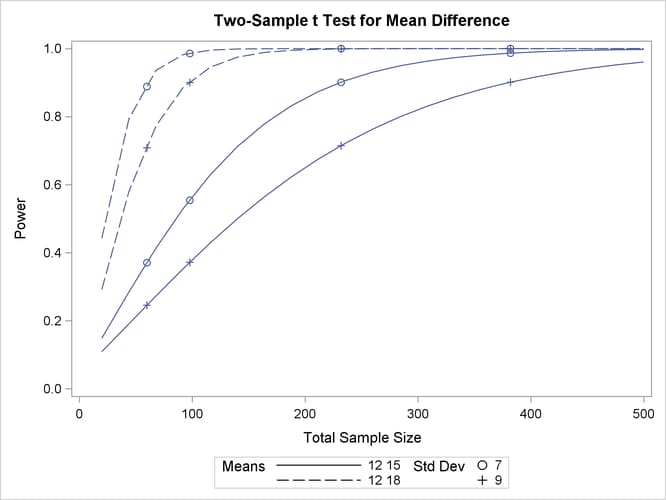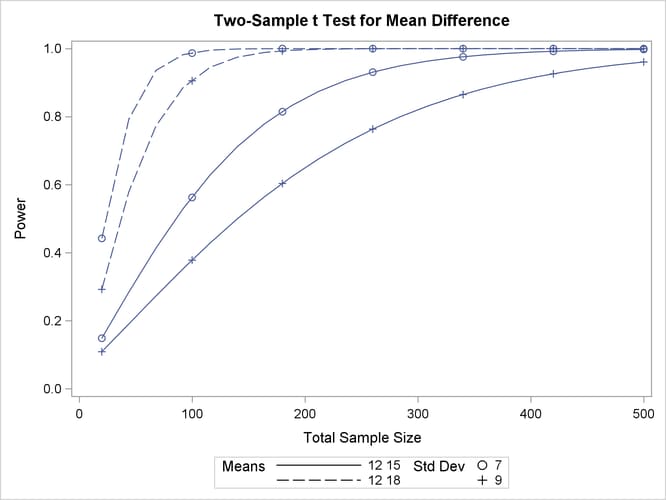The POWER Procedure
- Overview
-
Getting Started

-
Syntax
 PROC POWER StatementCOXREG StatementLOGISTIC StatementMULTREG StatementONECORR StatementONESAMPLEFREQ StatementONESAMPLEMEANS StatementONEWAYANOVA StatementPAIREDFREQ StatementPAIREDMEANS StatementPLOT StatementTWOSAMPLEFREQ StatementTWOSAMPLEMEANS StatementTWOSAMPLESURVIVAL StatementTWOSAMPLEWILCOXON Statement
PROC POWER StatementCOXREG StatementLOGISTIC StatementMULTREG StatementONECORR StatementONESAMPLEFREQ StatementONESAMPLEMEANS StatementONEWAYANOVA StatementPAIREDFREQ StatementPAIREDMEANS StatementPLOT StatementTWOSAMPLEFREQ StatementTWOSAMPLEMEANS StatementTWOSAMPLESURVIVAL StatementTWOSAMPLEWILCOXON Statement -
Details

-
Examples
 One-Way ANOVAThe Sawtooth Power Function in Proportion AnalysesSimple AB/BA Crossover DesignsNoninferiority Test with Lognormal DataMultiple Regression and CorrelationComparing Two Survival CurvesConfidence Interval PrecisionCustomizing PlotsBinary Logistic Regression with Independent PredictorsWilcoxon-Mann-Whitney Test
One-Way ANOVAThe Sawtooth Power Function in Proportion AnalysesSimple AB/BA Crossover DesignsNoninferiority Test with Lognormal DataMultiple Regression and CorrelationComparing Two Survival CurvesConfidence Interval PrecisionCustomizing PlotsBinary Logistic Regression with Independent PredictorsWilcoxon-Mann-Whitney Test - References
Modifying Symbol Locations
The default locations for plotting symbols are the points computed directly from the power and sample size algorithms. For example, Output 89.8.5 shows plotting symbols corresponding to computed points. The curves connecting these points are interpolated (as indicated by the INTERPOL= option in the PLOT statement).
You can modify the locations of plotting symbols by using the MARKERS= option in the PLOT statement. The MARKERS= ANALYSIS option places plotting symbols at locations corresponding to the input specified in the analysis statement preceding the PLOT statement. You might prefer this as an alternative to using reference lines to highlight specific points. For example, you can reproduce Output 89.8.5, but with the plotting symbols located at the sample sizes shown in Output 89.8.1, by using the following statements:
proc power plotonly;
twosamplemeans test=diff
groupmeans = 12 | 15 18
stddev = 7 9
power = .
ntotal = 232 382 60 98;
plot x=n min=20 max=500
markers=analysis;
run;
The analysis statement here is the TWOSAMPLEMEANS statement. The MARKERS= ANALYSIS option in the PLOT statement causes the plotting symbols to occur at sample sizes specified by the NTOTAL= option in the TWOSAMPLEMEANS statement: 232, 382, 60, and 98. The resulting plot is shown in Output 89.8.21.
Output 89.8.21: Plot with MARKERS=ANALYSIS

You can also use the MARKERS= NICE option to align symbols with the tick marks on one of the axes (the X axis when the X= option is used, or the Y axis when the Y= option is used):
plot x=n min=20 max=500
markers=nice;
The plot created by this PLOT statement is shown in Output 89.8.22.
Output 89.8.22: Plot with MARKERS=NICE

Note that the plotting symbols are aligned with the tick marks on the X axis because the X= option is specified.